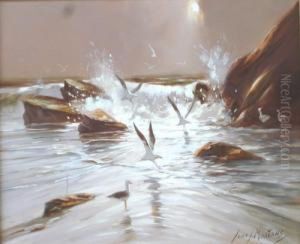Juan Martines Montanes Paintings
Juan Martínez Montañés, also known as 'el Dios de la Madera' (the God of Wood) due to his skill in wood carving, was a Spanish sculptor, considered one of the foremost figures of the Spanish Baroque. He was born in Alcalá la Real, Jaén, in 1568 and moved to Seville, which was a vibrant artistic center of Spain during the 16th and 17th centuries, where he lived and worked for most of his life.
Montañés is known for his religious sculptures and altarpieces, embodying the Counter-Reformation ideals. His works are characterized by their serene expressions, technical perfection, and the delicate treatment of the surfaces. He was a master in using 'estofado' technique, where gilt is applied to carved wood, often combined with polychrome. Montañés influenced not only his contemporaries but also the future generations of sculptors, including his most famous student, Alonso Cano, who went on to become a prominent figure in Spanish Baroque art as well.
One of Montañés’ most renowned works is the 'Cristo de la Clemencia' (Christ of Clemency), which is housed in the Cathedral of Seville. This sculpture is particularly noted for its realistic human anatomy and the expression of restrained pain, which was a significant departure from the more exaggerated emotive style of the period. His other famous works include the 'Virgin of the Immaculate Conception' and 'Saint John the Baptist', both of which display his expertise in human expression and intricate detailing.
Throughout his career, Montañés collaborated with other artists and architects, contributing to the completion of comprehensive projects that combined sculpture, painting, and architecture. His legacy lives on in the numerous churches and cathedrals across Spain that still house his works, and he is remembered as one of the pillars of Spanish Baroque sculpture. He passed away in Seville in 1649, leaving behind a body of work that continues to be studied and admired for its artistry and impact on the development of European sculpture.

